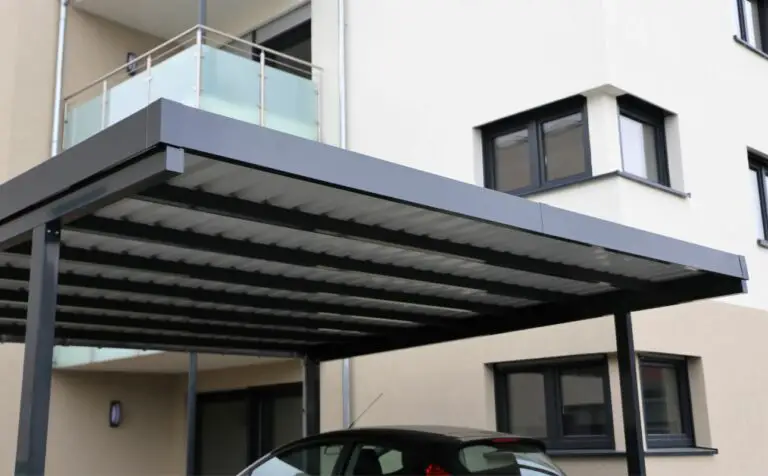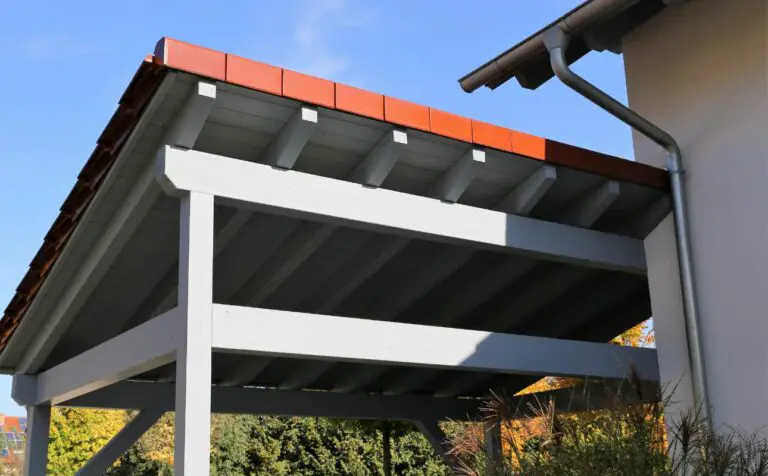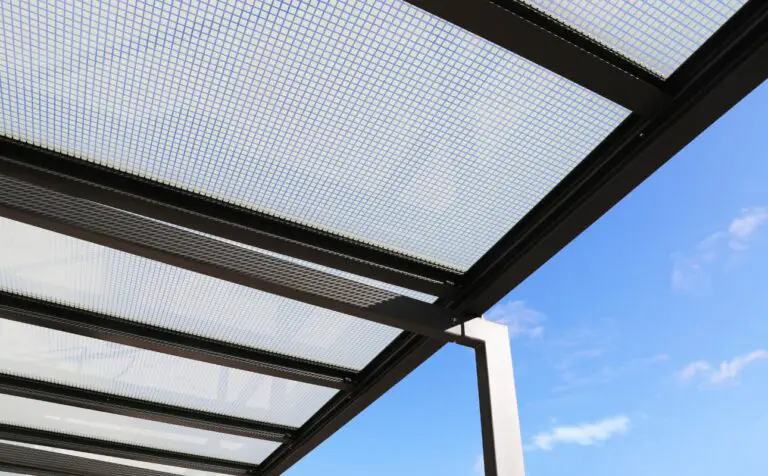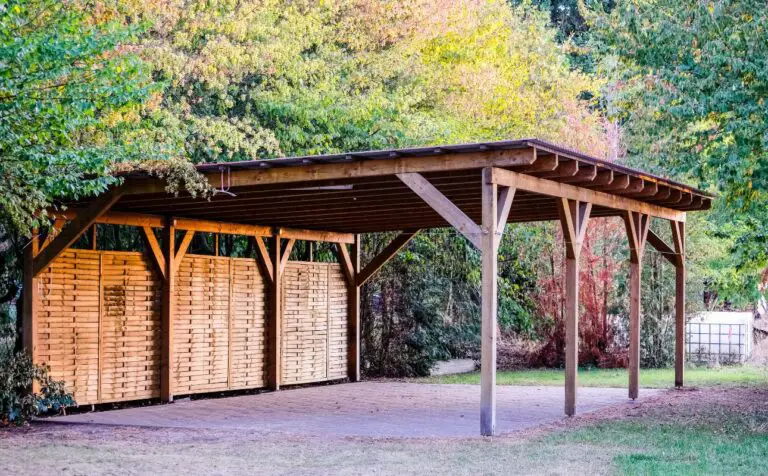Are Cantilever Carports Any Good? (Quick Review)
Imagine arriving home from a long day at work, only to discover your car is caked in snow or drenched in rain. You scramble to find shelter for your vehicle, but with no garage and limited space on the driveway, you’re left with few options.
This scenario is all too common for many homeowners who lack adequate protection for their vehicles. It’s where cantilever carports come into play.
Cantilever carports are structures that extend out from a building without any support columns or beams obstructing the parking area. They offer an aesthetically pleasing solution to protect cars from weather damage while maximizing space utilization.
But are cantilever carports any good? In this article, we’ll explore the benefits and drawbacks of cantilever carports. Let’s dig in.
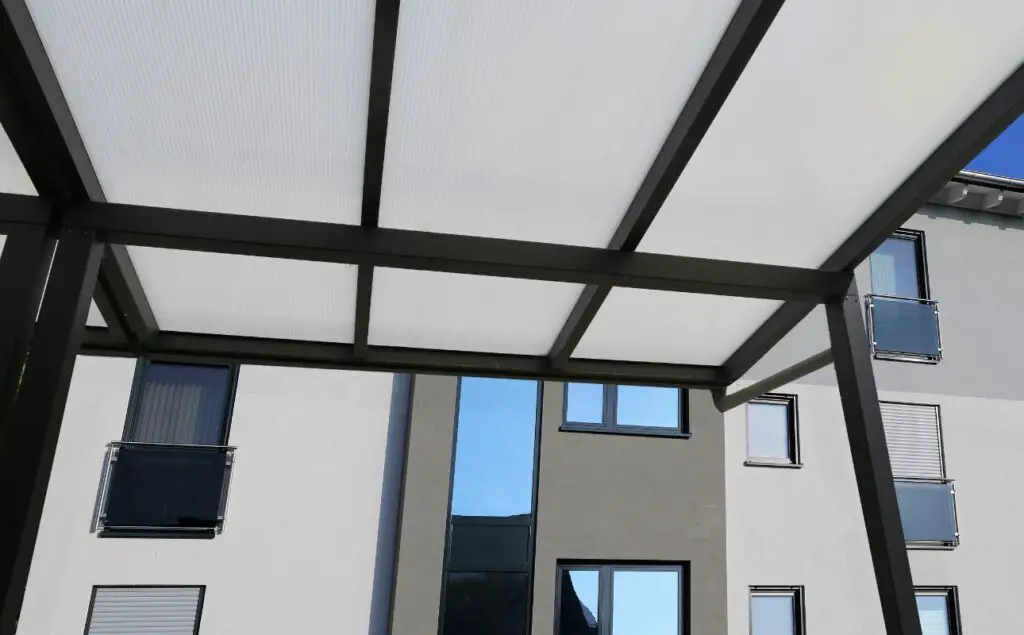
Benefits of Cantilever Carports
The advantages of this particular type of covered parking solution include increased flexibility in design, the potential for greater use of space, improved functionality and durability, and a reduced environmental impact.
Cantilever carports are cost-effective solutions that offer a practical alternative to traditional garage structures. They require fewer materials and can be installed more quickly than other types of carports.
Moreover, cantilever carports are known for their durability and resistance against harsh weather conditions such as strong winds or heavy rainfall. Their unique design allows for better drainage, which reduces the risk of water damage to vehicles parked underneath them.
Cantilever carports provide an unobstructed view and easy access to vehicles without requiring pillars or posts that can limit movement around parked cars.
Drawbacks of Cantilever Carports
Despite its potential benefits, this type of carport may have limitations that should be considered before installation.
Firstly, the installation process for cantilever carports can be more complicated than traditional carports due to the need for a sturdy foundation and specialized equipment. This can potentially increase the overall cost of installation and require professional assistance.
Secondly, in terms of cost comparison, cantilever carports tend to be more expensive than other types of carports due to their unique design and materials used.
Lastly, while these structures provide ample space for vehicles without obstructing walkways or driveways, they may not always provide sufficient protection from harsh weather conditions such as strong winds or heavy snowfall. Therefore, it is important to carefully weigh the pros and cons before deciding whether a cantilever carport is right for your needs.
Materials Used for Cantilever Carports
Steel and aluminum are the two most common materials used for cantilever carports. Steel is a durable and sturdy material that can withstand harsh weather conditions and has a longer lifespan than aluminum. However, steel requires regular maintenance to prevent rust, which can compromise its structural integrity over time.
Aluminum, on the other hand, is lightweight, corrosion-resistant, and requires minimal maintenance. It also offers a sleeker appearance compared to steel.
When it comes to choosing between steel vs aluminum for your cantilever carport, it’s essential to consider your budget, preferred aesthetics, and how much maintenance you’re willing to undertake in exchange for durability.
Choosing the Right Cantilever Carport
When choosing a cantilever carport, you should consider the cost comparison of different materials such as aluminum, steel or timber that are used in its construction.
Additionally, it’s important to evaluate the installation process and whether it requires specialized labor or if you can do it yourself. Another crucial factor is the design of the carport; opt for one that complements your house style and adds value to your property.
Lastly, location plays an integral role in determining the type of cantilever carport you require-whether it’s for residential or commercial purposes.
Maintenance and Care for Cantilever Carports
Proper maintenance and care are crucial for ensuring longevity and optimal Maintenance and care for cantilever carports are essential to ensure their longevity and optimal performance.
Here are some important tips to consider:
- Regular Cleaning
Clean your cantilever carport regularly to remove dirt, debris, and leaves that can accumulate on the structure. Use a soft brush or sponge with mild soap and water to gently scrub the surfaces. Avoid using abrasive cleaners or harsh chemicals that can damage the carport’s finish.
- Inspect for Damage
Regularly inspect your cantilever carport for any signs of damage, such as rust, corrosion, or loose components. Check the connections, bolts, and brackets for stability and tighten them if necessary. Look for any cracks or dents in the materials and address them promptly.
- Clear Snow and Ice
If you live in an area with snowfall, it’s important to remove snow and ice from your carport. Use a soft broom or plastic shovel to carefully clear the snow, avoiding any sharp objects that can scratch or damage the carport’s surfaces. Removing snow promptly prevents excessive weight and stress on the structure.
- Maintain Drainage
Ensure that the drainage system of your cantilever carport is clear and functioning properly. Clean out any debris or blockages in the gutters and downspouts to prevent water buildup. Proper drainage helps prevent water damage and prolongs the life of the carport.
- Address Rust and Corrosion
If you notice any signs of rust or corrosion on your cantilever carport, address it promptly to prevent further damage. Remove rust with a wire brush or sandpaper and apply a rust-resistant primer and paint to protect the affected areas. Regularly inspect and maintain the carport’s protective coatings.
- Trim Nearby Trees and Vegetation
If there are trees or vegetation near your cantilever carport, regularly trim them to prevent branches or leaves from rubbing against the structure. Overhanging branches can cause scratches, damage, or excessive debris buildup.
- Professional Inspection
Consider scheduling periodic professional inspections of your cantilever carport to ensure its structural integrity and identify any potential issues early on. Professional inspectors can provide expert guidance on maintenance and repairs specific to your carport’s design and materials.
The Bottom Line
Cantilever carports are a great option for those looking to protect their vehicles from the elements. They offer several benefits such as flexibility in design, easy installation, and space-saving capabilities.
While cantilever carports may not be perfect for all situations or climates, they can provide an excellent solution for those who need protection from the sun or light rain.
With proper maintenance and care, they can last for many years and provide reliable coverage for your vehicle.
Frequently Asked Questions
How much weight can a cantilever carport hold?
The weight capacity of a cantilever carport depends on several factors, including the design, materials used, and engineering specifications. Generally, a well-engineered cantilever carport can support significant weight loads, typically ranging from 20 to 50 pounds per square foot.
However, it’s important to consult with a structural engineer or the manufacturer of the carport to determine the specific weight capacity for the model you are considering, as it may vary.
Can a cantilever carport be used for other purposes besides for cars?
Cantilever carports have become increasingly popular due to their versatility and functionality. Besides providing shelter for cars, these structures are also suitable for other purposes such as hosting outdoor events or serving as storage solutions.
The open design of cantilever carports allows for ample space and easy access, making them ideal for gatherings such as parties or barbecues. Additionally, the roof overhang can be utilized to store items such as bicycles or gardening equipment.
What is the average lifespan of a cantilever carport?
The average lifespan of a cantilever carport varies depending on the materials used, the quality of construction, and maintenance practices. Generally, a well-maintained cantilever carport can last between 10-20 years.
The pros of a cantilever carport include its ability to provide shade and protection for vehicles without requiring support posts in the middle, which allows for more space and flexibility.
Is a permit required to install a cantilever carport?
Permit requirements vary depending on the location and zoning regulations of the installation. In most cases, a permit is required before installing a cantilever carport.
The installation process for cantilever carports involves several steps including site preparation, foundation construction, assembling the frame, attaching roof panels, and finishing touches such as gutter installation.

